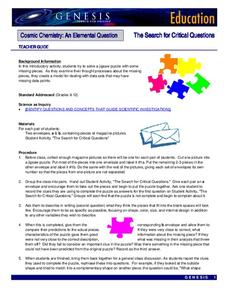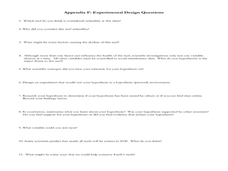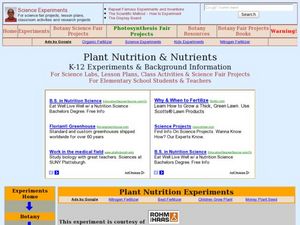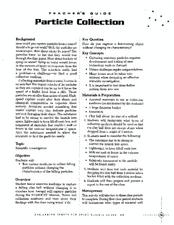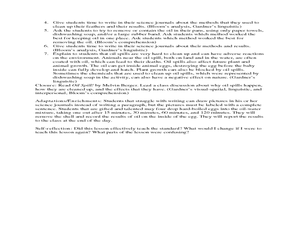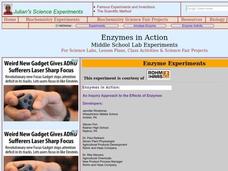NASA
A Different Perspective
What can we learn from the data? Young scholars analyze actual solar data to answer specific questions. The activity presents an opportunity for an open-ended investigation of the data to conclude a five-part series on solar winds.
National Nanotechnology Infrastructure Network
Small Scale Stenciling: Mask Lab
Investigate the procedure for developing computer chips! Learners use solar print paper to create both positive and negative images. They observe the effects of single and multiple exposures and compare results.
Missouri Department of Elementary
Fly Your Kite
Encourage scholars to become a productive community member with a kite-themed lesson. Following a review and discussion, learners complete a Venn diagram that displays the connection between character traits needed to make a home and...
Cornell University
Build a Fuel Cell
Discover the connection between redox reactions and fuel cells. Collaborative groups build a Hoffmann Apparatus that demonstrates the electrolysis of water and then convert their models into a fuel cell. They use their fuel cells to...
NASA
The Search for Critical Questions
A puzzle isn't about the individual pieces, but how they work together. Scholars assemble a puzzle and discover missing pieces. They write a description of what they expect these pieces to look like, including as many details as...
Columbus City Schools
Experiencing Eclipses
Don't be caught in the dark! Young scientists investigate the causes of both solar and lunar eclipses using an interactive to help them understand the development of an eclipse over time. They then research facts and characteristics of...
Benjamin Franklin Tercentenary
Ingenious: Franklin Assembles a Scientific Community
Few Americans have heard of the burgeoning scientific community known as the America Philosophical society, started by none other than Benjamin Franklin. With inquiry, research, and discussion, high schoolers come to understand their...
Mathematics Vision Project
Quadratic Functions
Inquiry-based learning and investigations form the basis of a deep understanding of quadratic functions in a very thorough unit plan. Learners develop recursive and closed methods for representing real-life situations, then apply these...
Centers for Ocean Sciences
Ocean and Great Lakes Literacy: Principle 7
Your mission, should you choose to accept it, is to take your class on an underwater adventure. The final installment in a seven-part series involving salt and freshwater bodies takes junior oceanographers below the surface in...
Curated OER
The Commission of Inquiry
Students explore the role and functions of a commission of inquiry and participate in a democratic debate.
Curated OER
Using Science Skills to Investigate Japanese Quail
Sixth graders explore Japanese Quail. They generate and record scientific questions about the quail. Students gather information from various sources and record their data. They compose an inquiry report and include it in a portfolio.
Curated OER
Marine Biology Lesson on Understanding the Dynamics of the Reef Ecosystem
Students compare data from a healty and unhealthy reef ecosystem. In this marine biology lesson, students identify which sample is stressed. They formulate a hypothesis on why the reef is stressed and support their hypothesis with proven...
Curated OER
This Lesson Is a Breeze, So Don't Blow It!
Students conduct an experiment to show that air is all around us and that wind is the movement of air. They construct a weather vane to determine which direction the wind is blowing.
Curated OER
Exercise and Heartrate
Fourth graders experiment to find the effects of exercise on the heart rate. In this exercise and heart rate lesson, 4th graders create questions about exercise and heart rate. Students use the scientific method to test and analyze...
Curated OER
Symmetry in Paper Airplanes
Students explore symmetry. For this geometry and scientific inquiry lesson, students design paper airplanes with middle line symmetry, as well as right, obtuse, and acute angles. Students measure the plane's angles using a protractor,...
Curated OER
Plant Nutrition and Nutrients
Students observe seeds growth and examine the different parts of the seedling. In this biology lesson, students compare the growth of seeds planted in soil and in hydroponics. They record their observations in their science journal and...
Curated OER
Fred the Fish -- A River Ran Wild
Students apply cause and effect relationships to water pollution in a stream. In this pollution lesson students recognize the importance of clean water in their daily lives. Students accompany "Fred the Fish" as he travels down stream....
Curated OER
Simple Machines
Students investigate simple machines. In this simple machines lesson, students construct two simple machines and describe what they do. Students show that simple changes help machines do work with less effort. Students use a paper clip...
Curated OER
Is the Hudson River Too Salty to Drink?
Students explore reasons for varied salinity in bodies of water. In this geographical inquiry lesson, students use a variety of visual and written information including maps, data tables, and graphs, to form a hypothesis as to why the...
Curated OER
Particle Collection
Learners research various substances to test their ability to collect particles from a comets tail. In this inquiry based space science lesson, students drop a clay ball into a substance to test if the ball has been changed in any...
Curated OER
Experience the 5E Instructional Model with Electrical Circuits
Students build electrical circuits. In this lesson teaching pre-service teachers how to use the 5E instructional model, students use materials to explore how to create an electrical circuit.
Curated OER
Simple Harmonic Motion with Dr. DAQ
Young scholars study the work and accomplishment of Galileo. In this physics lesson, students calculate the period of a pendulum's using a mathematical equation. They explain the different factors affecting its period.
Curated OER
Cleaning an Oil Spill
Third graders use oil, feathers, eggs, rubber bands, and more to create a simulated oil spill and then clean it up. For this oil spill lesson plan, 3rd graders discuss what their cleaning process is like and how the oceans are effected...
Curated OER
Enzymes in Action
Young scholars explore how enzymes are important in the chemical reactions of all living things. In this enzymes and catalysts lesson students complete an activity to see how enzymes change living things.
Other popular searches
- Inquiry Based Science Lessons
- Life Science Inquiry Lessons
- Inquiry Science Lessons
- Inquiry Based Science Lessons






